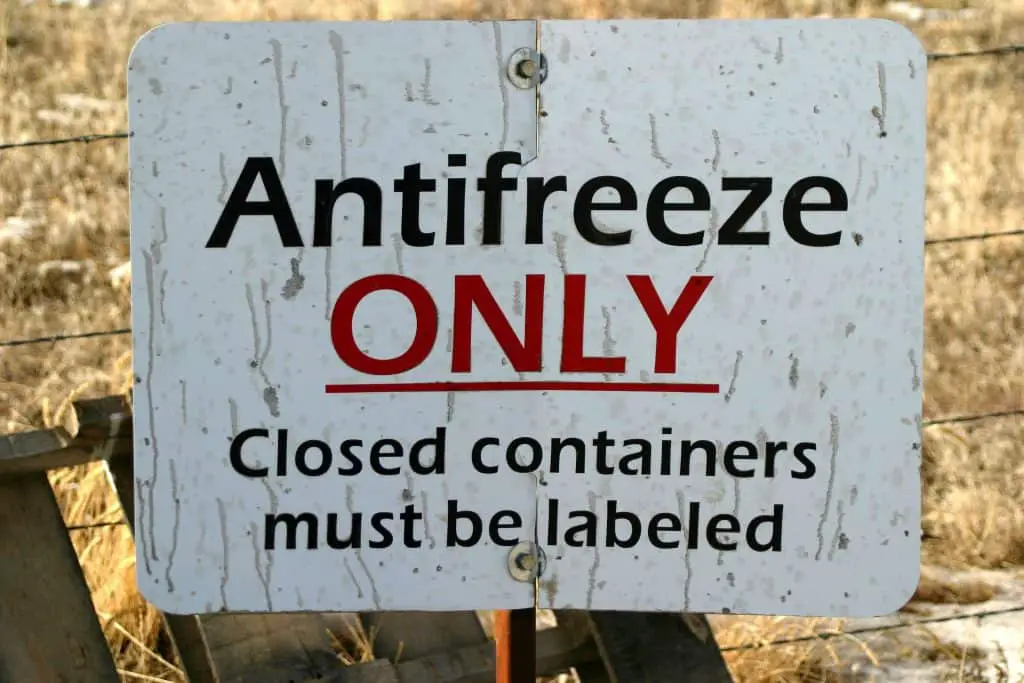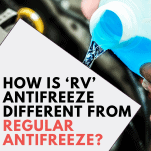Antifreeze is something that a lot of people are familiar with, as it is the key component in winterization. RVers, in particular, need to pay close attention to it since they need to plan about winter months before it arrives. As an RVer you might be curious about the difference between car antifreeze and RV antifreeze. Which should you use?
When it comes to RV antifreeze vs car antifreeze the single most important difference is that the RV antifreeze is chemically safe while car antifreeze is a highly toxic liquid.
There’s a lot more to RV antifreeze and regular antifreeze than that. It is helpful to know when to use which one, and this article should help you get a better understanding of it.
RV Antifreeze vs Car Antifreeze
Basics Differences
RV antifreeze differs from regular motor antifreeze, not just because it’s non-toxic. These are meant to be put directly into the plumbing system. A good way to tell if it’s RV antifreeze or car antifreeze is the color. RV antifreeze is almost exclusively pink.
Car antifreeze is always very toxic and harmful for both men and animals alike. They come in various colors but green or yellow-green is the standard. Car antifreeze is only for the engines. You most likely need to pour it directly into the radiator.
Both types of antifreeze do the same job, they lower the freezing point and increase the boiling point of liquids. What that means is that they are handy for making liquids stay in their liquid forms in extensive lowered or higher temperature.
Some antifreeze only keeps the freezing point lower, while ignoring the boiling point. These can never be used as car Antifreeze because the ones used for cars are not used to defrosting the car, it is used as a coolant.
Usage
Car antifreeze and RV antifreeze are not meant for the same kind of usage. Car antifreeze is strictly for the engine and to keep its temperature stable; while, RV antifreeze has a wide range of applications ranging from the water tank, plumbing to even substitute for emergency ice removers.
RV antifreeze:
RV antifreeze is a lot cheaper than Car antifreeze because there’s a lot less density to it. RV antifreeze can be used a lot more flexibly than can antifreeze. Ideally, you would empty all your water tanks and storages, as well as every part of your plumbing.
If there is any water left in there, it might freeze up during the winter, and when it does, the pressure will crack the pipelines. After emptying everything just pour down the required amount of antifreeze liquid into it. It might turn into slush in -50, but nothing will freeze-up.
One thing to keep in mind, unlike car antifreeze, RV antifreeze is meant to be used at full strength. So, you don’t have to mix it up with other liquid for it to work.
Car antifreeze:
Car antifreeze is a rather common sight; it’s the coolant that people replace after a certain amount of time. Usually once every couple of years. The base system is the same for all types of vehicle engines. Add a 50/50 mixture of antifreeze and water directly into the radiator valve and rev up the engine till the air is out.
Normally people would mix clean water with the antifreeze, but it isn’t ideal to use regular water, as it can cause corrosion over time. Distilled water is the best choice for Car antifreeze.
It is also a bad idea to put 100% antifreeze in your car, as your water pump might end up failing. It happens because water is a lot less thick than antifreeze. Note that antifreeze is not what people call “coolant” It’s the mixture of water and antifreeze together that gets that name.
Ingredients
RV antifreeze: RV antifreeze is made with non-toxic materials; as such, it is not a potential health hazard for humans or animals. Most RV antifreeze brands use ethanol or propylene as their base ingredient.
Ethanol-based antifreeze is only used to lower the freezing point of liquids. It does not raise the boiling point, so this is strictly used, for preventing freezing. It does not work as a coolant.
Propylene, on the other hand, lowers the freezing point while also raising the boiling point at the same time. That’s why it is the superior of the two. Propylene sees more diverse usage than ethanol.
They can be found either in concentrated form, which needs to be diluted with liquids later on; or in a pre-diluted state sold in containers ranging from gallons. It can be put directly into your RV’s system with no additional mixing needed.
Car antifreeze: the most common material used in car/ automotive antifreeze is ethylene glycol. It does not have any scent or smell; it tastes rather sweet too. But this is a highly toxic material that is also commonly used in suicide attempts.
Depending on what type it is infused with, car antifreeze can come in many colors. Silicates are usually green, Organic Acids are orange, and a mixture of Silicates & Organic acid is yellowish.
Mistakes to Avoid
Now you know what the different types of antifreeze are and how to use them. There are still some things that you should be cautious of while handling these materials.
- Mixing different brands or types
One of the biggest mistakes people make regarding antifreeze usage is mixing them. Can you mix RV antifreeze with regular antifreeze? The answer to that is a BIG “NO”. Not only is it not safe to mix two different types of antifreeze, but you should also avoid mixing different brands of the same kind of antifreeze.
Most brands add different chemical compounds in their blend and they almost never go well together. Even mixing two different brands of car antifreeze will make a thick liquid, akin to jello, and render it more or less useless.
Even if they don’t produce bad reactions immediately, they can slowly cause corrosion in the engine or in the RV’s plumbing.
- Non-toxic doesn’t make it safe
RV antifreeze is not poisonous but that does not mean it’s good for the human body. Never try to drink the fluid in its undiluted state. It is safe to drink from the tank as long it’s filled with enough clean water.
Antifreeze is an alcoholic content, but never use it to treat your wounds. Trust me, not a good idea.
- Keep children and pets away
Car antifreeze is extremely toxic, I would recommend keeping it away from pets and children at all times. It is also a good idea to at least take some protective measures while pouring it in the car.
Choosing the Right Antifreeze
RV antifreeze is easy to identify. Just go for the ones that look some variant of pink in color, that’s more or less all there is to know about these. And depending on your budget you could get the prediluted ones that can be poured straight out of the container, or the concentrated one that you need to mix yourself.
For Car RV it is always best to check in with your dealers. Most engines are compatible with a specific kind of antifreeze, and using other variants can cause corrosion.
Conclusion
When it comes to RV antifreeze vs car antifreeze, RV antifreeze stands as the most versatile one because of its extensive usage and nature-friendly attributes. Yet, car antifreeze is indispensable because without its engines would become useless.
Related Posts:
This is How to Properly Dispose of RV Antifreeze
Does RV Antifreeze Go Bad or Expire? Shelf Life of Antifreeze



